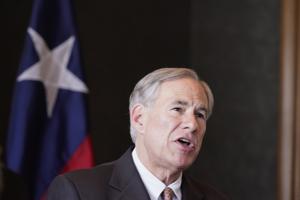Abbott signs human smuggling bill into law in McAllen, major hub of illegal immigration

(The Center Square) – Gov. Greg Abbott has signed SB 576 into law, a bill passed by the state legislature to strengthen penalties against human smuggling in Texas. Abbott signed the bill in the border town of McAllen, a major hub of human and drug smuggling facilitated by illegal immigration.
Joining him was newly sworn in Republican Mayor Javier Villalobos and state Rep. JM Lozano, R-Kingsville, who cosponsored the bill, as well as McAllen City Commissioners, members of law enforcement and the judiciary, and other local officials from the Rio Grande Valley area.
“As we continue to combat the crisis at our border, the state of Texas is using every tool we have to secure the border and protect innocent lives from crimes related to illegal immigration like human smuggling,” Abbott said.
SB 576 enhances the criminal penalty for human smuggling when a payment is involved and eliminates the requirement of proof for prosecution that a smuggler intended to receive payment for the crime of human smuggling.
According to an annual report by the Texas Attorney General’s Office, while many criminal enterprises in Texas slowed down because of COVID-19 in 2020, “human trafficking flourished.”
During the first 11 months of 2020, there were more than 1.5 million unique commercial sex advertisements posted in the state of Texas, over 20% of which advertised suspected children, the report found.
There are four major types of trafficking; all involve human smuggling: adult sex trafficking, adult labor trafficking, child sex trafficking and child labor trafficking.
Adult sex trafficking involves trafficking adults for commercial sex by force, fraud, or coercion; labor trafficking involves trafficking adults for labor by force, fraud, or coercion Child sex trafficking involves trafficking children under age 18 for commercial sex by any means; labor trafficking involves trafficking children under age 18 for labor by force, fraud, or coercion.
In addition to prosecutorial efforts by the Attorney General’s Office, the Cities Empowered Against Sexual Exploitation (CEASE) Texas, a project managed by CHILDREN AT RISK and funded by the Office of the Governor, has been working with teams of volunteers to combat child trafficking. It engages in online buyer disruption tactics on a monthly basis. Last year, it disrupted more than 800 attempted sex purchases during live, online patrols.
“CEASE research shows that the demand for commercial sex has not measurably decreased during COVID-19, outside of regions which have additional cofactors such as a large tourism industry,” the AG’s report states of the program. Additionally, the CEASE database “collected over 340,000 unique ads scraped from online sites across Texas,” it states.
Because of increased funding by the legislature, the group was able to help 61,891 child victims of abuse in fiscal 2020, a 3.3% increase from fiscal 2019. Among them, 35,476 cases involved an allegation of child sexual abuse, including more than 580 children identified as victims of child sex trafficking, the report found.
According to a statewide Human Trafficking Mapping Project of Texas, a collaboration among several groups including the Bureau of Business Research at the University of Texas at Austin, there are more than 300,000 victims of human trafficking in Texas. Among them, nearly 79,000 are minors and youth victims; nearly 234,000 are adult victims of labor trafficking.
The project estimates that “minor and youth sex trafficking costs the state of Texas approximately $6.6 billion annually, and traffickers exploit approximately $600 million from victims of labor trafficking in Texas.”
According to the National Human Trafficking Hotline, Texas experienced 1,080 reported cases of human trafficking in 2019.
According to the Center for Public Policy Studies, nearly 20% of all trafficking victims in the U.S. travel through Texas, usually along the Interstate 10 corridor. The entire I-10 highway stretches from Los Angeles, California, to Jacksonville, Florida.
In Texas, I-10 runs from east of the Texas-New Mexico border town of Anthony, to El Paso, San Antonio and Houston and eventually to Orange, at the Texas-Louisiana border. The Texas stretch is roughly 880 miles, the longest stretch of Interstate Highway in the U.S. with a single designation within a single state.
SB 576 followed another human trafficking bill, HB 1540, which went into effect Sept. 1, making Texas the first state to punish sex buyers with a felony.
The new law creates a separate offense for buying sex and raises the penalty to a state felony subject to jail time. It expanded first-degree felony human trafficking to include certain actions related to obtaining victims from shelters or certain residential facilities. It also requires the state to deny some alcoholic beverage licenses and permits if drink solicitation occurs. It also amends provisions governing common nuisance lawsuits relating to prostitution and illegal massage operations, and amends provisions on civil racketeering relating to human trafficking.
“Texas is the first in the country to punish sex buyers with felonies, which is a substantial step towards curbing the demand for commercial sex,” Attorney General Ken Paxton said in a statement. “Human trafficking is modern day slavery – targeting vulnerable men, women and children in our communities. I commend our legislature for passing laws that fight this inexcusable offense.”
Disclaimer: This content is distributed by The Center Square

